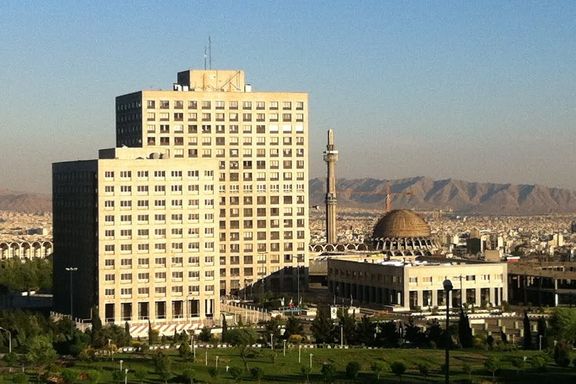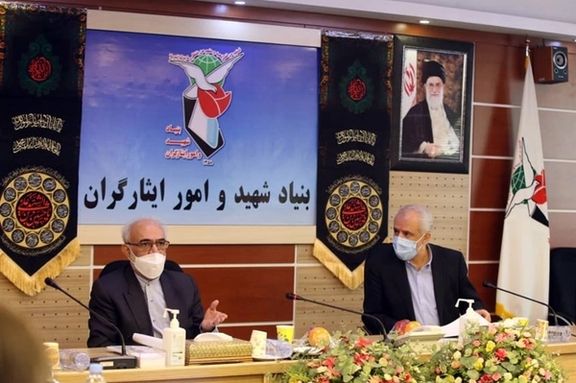US Should Sanction The New Head And Businesses Of Iran’s Martyrs Foundation

Amir Hossein Ghazizadeh Hashemi is settling into a new job as chief of the Foundation of Martyrs and Veterans Affairs, a behemoth linked to the Revolutionary Guards (IRGC).

Amir Hossein Ghazizadeh Hashemi is settling into a new job as chief of the Foundation of Martyrs and Veterans Affairs, a behemoth linked to the Revolutionary Guards (IRGC).
Hashemi was appointed earlier this month by President Ebrahim Raisi (Raeesi), putting him for the first time in charge of a financial powerhouse, with millions under its care. Raisi has also handed him a potential political base with a chance to develop closer ties across the military, including the IRGC’s extraterritorial, dark-arts Quds (Qods) Force.
Before serving as the head of the martyrs foundation, Ghazizadeh was the deputy speaker of the Majles, the Islamic Republic’s parliament. He is a former member of the Paidary Front, an ultra-hardline political organization founded by disciples and supporters of Mohammad Taghi Mesbah Yazdi, a militant cleric even by the Islamic Republic’s standards. Ghazizadeh also ran in Iran’s 2021 presidential elections and came in fourth. He comes from a prominent insider family: a brother and a cousin serve in the Majles and another cousin is a former health minister.

In 1980 then-Supreme Leader Ruhollah Khomeini established the foundation to aid the families of those who had fallen in the revolution. As the Iran-Iraq war began, the foundation added the families of war dead to its portfolio. In 2004 providing service to veterans was added to its responsibilities. Like many other institutions in the Islamic Republic, the foundation’s leadership consists of two primary officials: the supreme leader’s representative and the head of the foundation. Iran’s president appoints the head in consultation with the supreme leader, effectively intertwining the two roles.
Since martyrdom is the cornerstone of Shiism, martyrs, veterans, and their families are of immense political importance. The foundation has been the vehicle for keeping the families of martyrs aligned politically: it rewards regime-supporters with financial benefits and employment and education opportunities. The refractory lose these benefits and more.
While Iran’s national budget provides it with funding, the foundation also has a vast business empire and operates abroad. It thus has prodigious financial resources to advance its agenda. One of the key business entities it controls is Kowsar Economic Organization, which owns 43 firms, some of which are holdings or investing companies, with extensive interests in a wide range of industries. The Shahed Investment Company is another major economic arm of the organization that is publicly traded and heavily involved in the real estate and construction sectors. The foundation also owns Dey Bank, which the United States sanctioned in 2018. These three entities closely work together and have intertwined ownershipstructures and operations.

The foundation extends services to martyrs and veterans from other countries, too. Last year, the foundation’s chief announced that it covers members of the Fatemiyoun brigades, the Shiite Afghan brigade of the Quds Force, which has been fighting alongside the IRGC in Syria. The Lebanese Hezbollah has its own martyrs foundation, founded in 1982, which is, according to the U.S. Treasury, a branch of Iran’s martyrs foundation. The Iranian foundation and its officials regularly meet with representatives of Hezbollah and provide technical and financial support. Similarly, in Yemen, the Iranian foundation has created a branch to help the Shiite Houthis, according to some reports.
The Iranian organization also supports families of Palestinian terrorists through the Palestinian Martyrs Foundation, founded in 1993 as a branch of the Lebanese foundation. The Iranian mothership’s relations with its foreign proxies are quite similar to the Quds Force’s relationship with its foreign proxies — that is, the foundation provides financial, training, and technical support to loyal local elements, who then run the day-to-day operations of the affiliated organizations.
The United States first sanctioned the Iranian foundation and its Lebanese branch in 2007. Over the years, this organization and its front companies managed to raise funds in the United States and transfer it to Hezbollah. In 2020 Treasury designated a network of firms and individuals related to the Lebanese foundation. However, Washington has not sanctioned the Iranian Martyrs Foundation’s business network even though Tehran uses it to finance terrorism by guaranteeing lifelong financial support for jihadists, terrorists, and their families.
That omission warrants correction: Washington should sanction Ghazizadeh and the rest of the foundation’s leadership. The Kowsar Economic Organization, Shahed Company, and their subsidiaries and controlled firms should also not escape punishment.
Saeed Ghasseminejad is a senior advisor on Iran and financial economics at the Foundation for Defense of Democracies (FDD). Follow Saeed on Twitter @SGhasseminejad. FDD is a Washington, DC-based, non-partisan research institute focusing on national security and foreign policy.
The opinions expressed by the author are not necessarily the views of Iran International